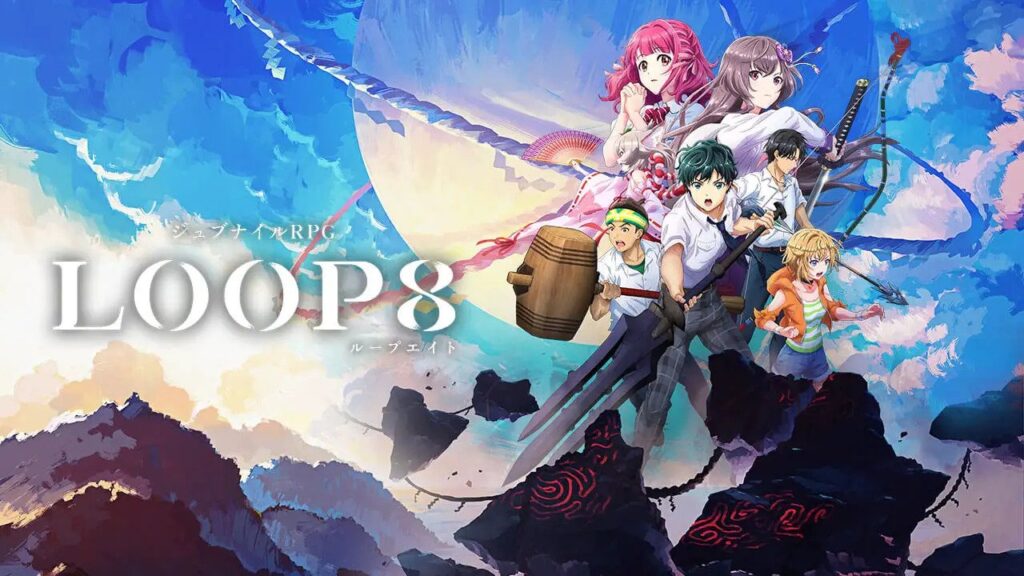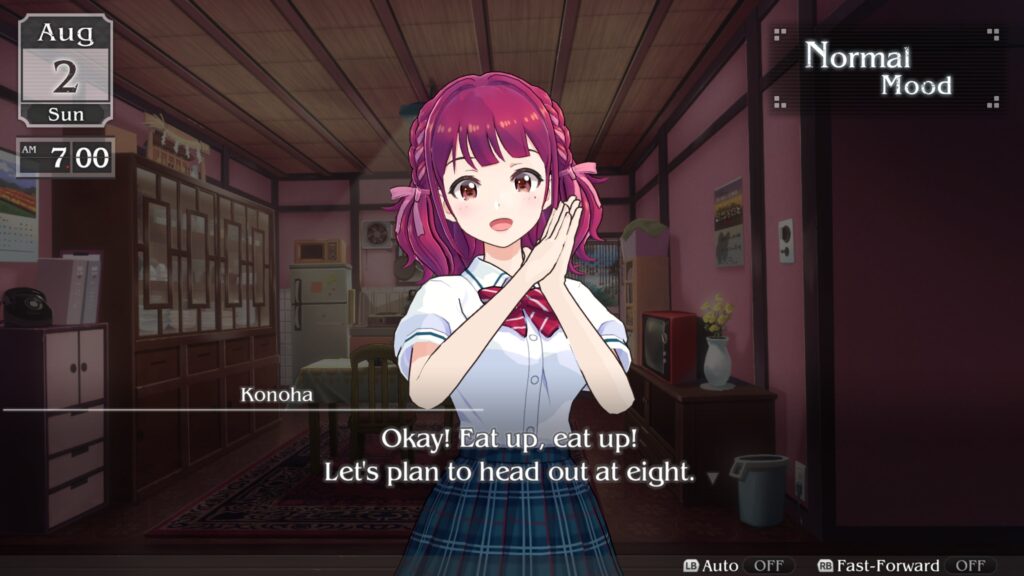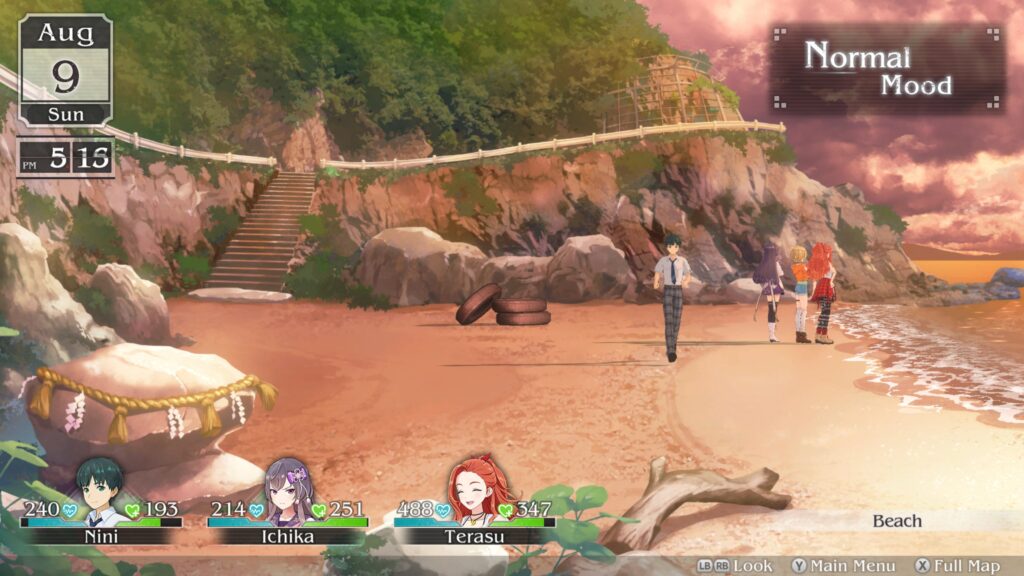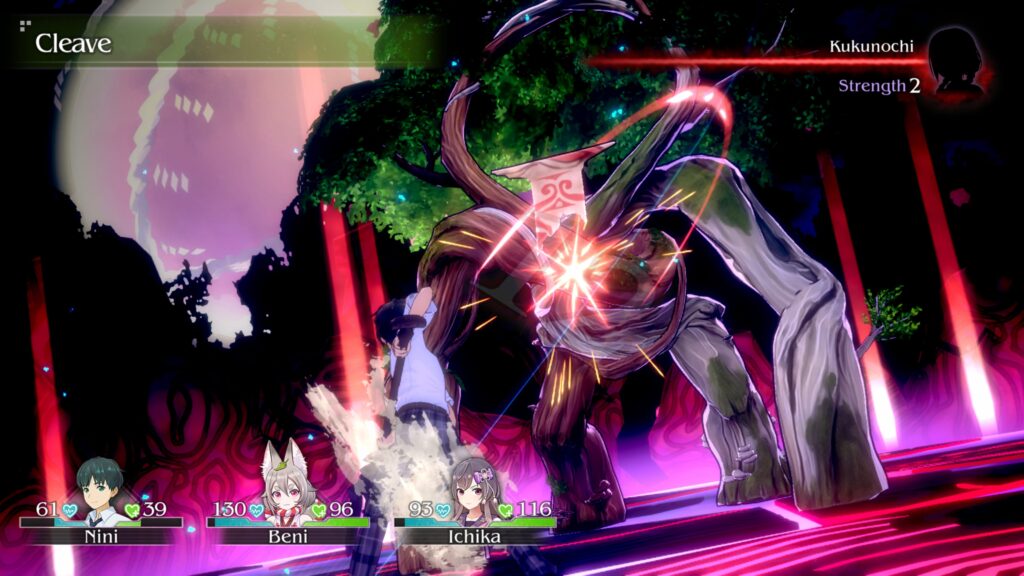
Developer: Marvelous
Publisher: Xseed Games
Platform: PC, Switch, PS4, Xbox One
Tested on: PC
Loop8: Summer of Gods – Review
When Loop8: Summer of Gods was announced earlier this year, it piqued our interest by promising a coming-of-age RPG where your relationship with characters influenced your power in combat. Combining this with a time loop mechanic, the developers wanted to deliver a gameplay experience like no other. Now that the game is out in the wild and we have spent some time with it, it’s time to answer the question of whether or not the game was able to do what it promised.
Story
The story of Loop8: Summer of Gods begins with the main character, Nini, arriving in a rural Japanese village after the space station he grew up on is destroyed by the Kegai. These monsters have been threatening the human race since the beginning of time, aiming for its extinction. Now they are targeting Nini’s new home, where he will have to build relationships with the inhabitants to fight back against this demonic threat. A big help in this process is his new ability to rewind time to the point where he arrived at the train station. This setup is introduced at the beginning of the game and will be elaborated on when talking to the right characters. The game uses a gameplay loop where one of the Kegai targets a specific character and you must defeat it in a certain number of days, with the narrative shifting focus to that specific character and his or her backstory.
Another mechanic that plays a role here is the fact that the targeted character is random and changes every time you hit the rewind button. This makes every playthrough unique but also causes a disjointed feeling after a few people have been targeted and resolved. People will acknowledge things that have happened, but only in a passing manner without it having an effect on the overarching narrative. It is hard not to compare Loop8: Summer of Gods to the Persona series, especially Persona 5, since that game pretty much perfected social mechanics. It was rightfully praised for letting players get to know a fun cast of characters and developing relationships with them. This is where Loop8: Summer of Gods drops the ball. All of the characters have great designs and look fun, but once you start talking to them, you’ll realize they aren’t anything more than stereotypes and there are no real interactions to be had with them. The most interesting they have to offer is the pieces of backstory you’ll get when they are targeted.
Graphics
Loop8: Summer of Gods definitely has its looks going for it. The game features a typical anime art style, but the quality of the designs and models is one of the best the genre has to offer. It is clear there was a lot of care put into the characters and their animations. This is in contrast to the enemy’s designs since most Kegai outside of the bosses are the same enemies with a color swap.
Sound
Most of the game time is spent running around the village and talking to people. Since this is a laid-back activity, it’s understandable that most of the soundtrack consists of calming tunes that give of a slice-of-life vibe. This delivers a great atmosphere and pumps up the jam when the fighting begins. The game also features both a Japanese and English voice cast. These performances are your typical JRPG fare with some hits and some misses. It is most definitely appreciated but it can get a bit annoying after restarting the loop and hearing the same interactions again.
Gameplay
Loop8: Summer of Gods is a turn-based RPG with a big focus on interactions with NPCs and relationship building. The gameplay comprises two major elements. First, there is the social interaction with the other characters in the game. Building these relations will help you in combat and get you one step closer to saving the world. Next, there are turn-based battles, where you’ll take a team of three people against a bunch of demons and big bosses. Most of your playtime will be spent running around the village and talking to the characters that inhabit it. This is a crucial part of Loop8 since these interactions build relations that are needed to progress the game. While talking to your friends, you’ll be prompted by some conversation options that can influence three emotions: friendship, adoration, and hate. Raising the number connected to the positive emotions will unlock new dialogue options and improve the character’s stats. Every day has a limited amount of hours in it, meaning you’ll have to plan whom you talk to and for how long. While the interactions themselves don’t take up time, traveling and activities do.
While this does sound like an interesting concept, it falls flat due to the empty interactions. None of the dialogue options deliver actual conversations, they mostly just show a sentence that indicates that it was successful as well as the change in the character’s mood. Even when reaching a milestone in affection, where other games would reward you with some character moments or backstory, Loop8: Summer of Gods just gives you a bland interaction and that’s it. Building these relations feels more like button-mashing through dialogue to get the max amount of stats.
But you haven’t got forever to talk to everyone since you’ll have to do some fighting as well. At the beginning of a game section, a character gets possessed by a Kegai and has to be dealt with in a certain amount of days or the world will end. Each night you’ll get a hint about who the victim is and where they can be encountered. Once you figured that out, you’ll be able to enter a distorted version of the village. Here you’ll encounter monsters while looking for orbs to unlock the way to the possessive Kegai, which has to be defeated to hopefully save the victim. These battles are your typical turn-based encounters with a few twists. Firstly your stats are dependent on how your teammates feel about you, but also how they feel about each other. Aside from that, attacks can be given an emotion. Feelings, like friendship, deal less damage but if you use emotions like anger too much, you’ll provoke the opponent, making them stronger. This does give a nice twist to the combat and makes you think more about how much damage you want to deal in combat, going for a high-risk high-reward approach.
When you aren’t able to defeat the Kegai, the world will end and a new loop will begin. This means that you’ll go back to the start of your journey, and all the relationships have been reset. The only thing that carries over are blessings, which are permanent buffs to you and your friends that can be found around the village or are unlocked after reaching some relationship milestones. When you start talking to people again, you’ll soon realize that the connections you had in previous loops developed faster than they had before, delivering a secondary buff to resetting the time loop. The big bummer about this is that all the dialogue has to be done again, which is especially annoying for characters that have a dozen of interactions with exposition you already know before you can start building your relationship again. You can fast-forward the dialogue but there is no way to skip it entirely. Another thing that changes with each loop is the order in which the characters are targeted by the Kegai, meaning you’ll only get to use your accumulated knowledge about them after a few loops. Combined with the easier relationships, Loop8: Summer of Gods only delivers a feeling of progression quite late in the game.
Conclusion
Loop8: Summer of Gods is a game with big ambitions but fails to deliver on them. When characters and relationships between them are the core of your game, it’s important to make these engaging and feel consequential. This makes the okay combat feel less impressive since you aren’t invested in the outcome. The game does however deliver a nice presentation and can be fun for people who are willing to put dozens of hours into the game and enjoy numbers going up. This was a missed opportunity but hopefully paves the way for a better use of the interesting concepts that were seen here.
Loop8: Summer of Gods - Review,









No Comments